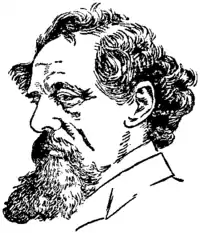DICKENS, CHARLES, an English novelist; born in Landport, Portsea, Feb. 7, 1812. Early in life the law was selected as his future profession, but the drudgery of an attorney's office worried him, and removing to London he became a reporter of Parliamentary debates for the “Morning Chronicle” newspaper. To this journal he presently contributed a series of papers sketching off the social characteristics of English middle and low class life. In 1836, under the title of “Tales and Sketches by Boz” the papers were published in two volumes. The production of the celebrated “Pickwick Papers,” in the year following (1837), conclusively stamped him as an author of a peculiarly original cast of genius. A long and brilliant series of successes followed. His works include: “Sketches by Boz” (1835-1836); “Pickwick Papers” (1837); “Oliver Twist” (1838-1839); “Nicholas Nickleby” (1839); “Master Humphrey's Clock” (1840-1841), a weekly issue in periodical form, comprising among others the installments of “Old Curiosity Shop” and “Barnaby Rudge”; “American Notes” (1842); “A Christmas Carol” (1843) ; “Martin Chuzzlewit” (1844); “The Chimes” (1844); “The Cricket on the Hearth” (1845); “Pictures from Italy” (1846); “The Battle of Life” (1846); “Dombey and Son” (1848); “The Haunted Man” (1848); “David Copperfield” (1850); “Bleak House” (1853); “A Child's History of England” (1854); “Hard Times” (1854); “Little Dorrit” (1857); “A Tale of Two Cities” (1859); “Great Expectations” (1861); “Our Mutual Friend” (1865); “The Mystery of Edwin Drood” (1870), unfinished; and many short pieces and humorous essays, stories, and sketches. He died in Gad's Hill Place, near Rochester (England), June 9, 1870.

CHARLES DICKENS